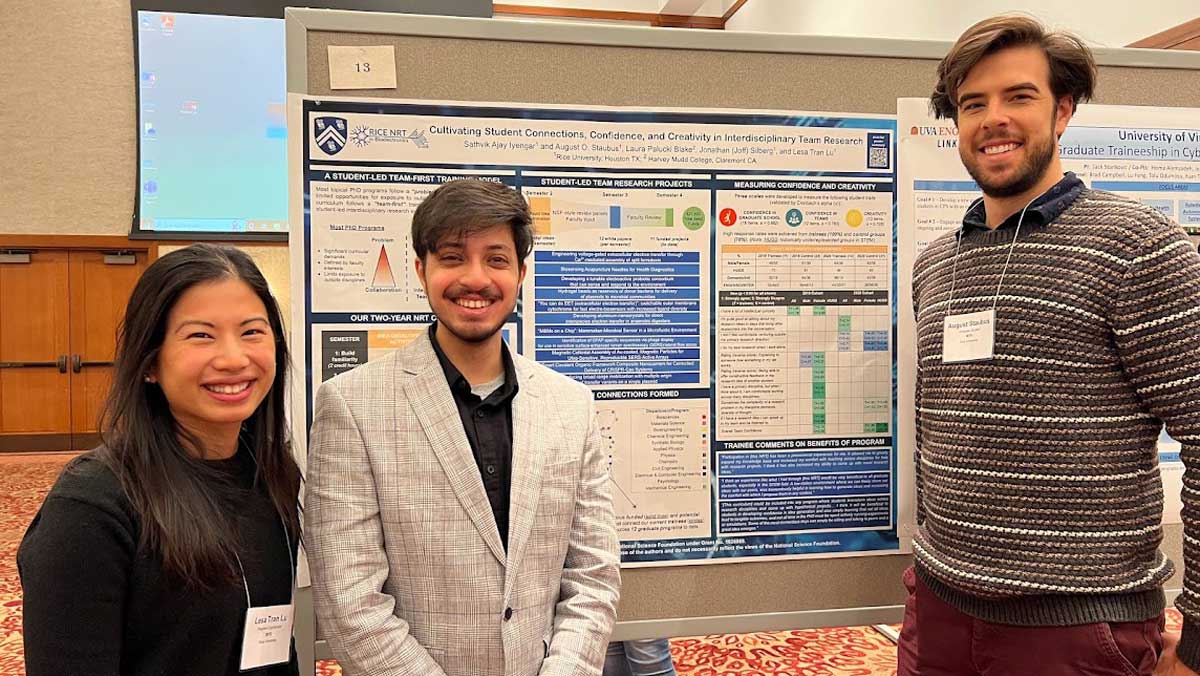For the third year in a row, Sathvik Ajay Iyengar, a third-year doctoral student in materials science and nanoengineering (MSNE) at Rice University, presented his research at the NSF Research Traineeship (NRT) Annual Meeting.
Iyengar is enrolled in Rice’s Bioelectronics NRT program, which encourages a graduate student-led interdisciplinary approach to research among the schools of engineering, natural sciences and social sciences.
The annual meeting was held Oct. 17-19 at Virginia Tech in Blacksburg, Va. The conference, the largest to date, included poster sessions, panel discussions and lightning talks from students in some 100 NSF-funded training programs across the U.S.
“The poster session showed that Rice’s NRT program is one of the most interdisciplinary. The research network map I prepared as a poster was a star attraction. It showed how rich and diverse our network of student-led collaborations is across 12 departments at Rice,” Iyengar said.
Iyengar is a member of the research group of Pulickel Ajayan, the Benjamin M. and Mary Greenwood Anderson Professor of Engineering and department chair of MSNE. Iyengar’s research interests focus on 2D materials, the physics and chemistry of their atom-thick arrangements and potential applications in new device architectures.
Also in attendance from Rice were Jonathan “Joff” Silberg, the Stewart Memorial Professor of BioSciences, director of Systems, Synthetic, and Physical Biology, and NRT program director; Lesa Tran Lu, associate teaching professor and associate director for educational programs in the Institute of Biosciences and Bioengineering (IBB), and NRT program manager; and August Staubus, fourth-year doctoral student in the Biochemistry and Cell Biology graduate program.
“What sets us apart from any other NRT program,” Lu said, “is our curriculum that focuses on improving student confidence and creativity in graduate school. Our trainees have an opportunity to apply for seed funds through our program to support their original team research ideas.”
Other engineering graduate students in the Bioelectronics NRT program are Tasfia Azim, chemical and biomolecular engineering (ChBE); Elizabeth (Lissa) Blackert, MSNE; Tessa Crosby, civil and environmental engineering (CEE); Jessica Gayle, MSNE; Jacob Goell, bioengineering (BIOE); Manwal Harb, BIOE; Zachary LaTurner, CEE; Dana Lobmeyer, ChBE; Alix Macklin, electrical and computer engineering (ECE); Alianna Maguire, mechanical engineering; Christine Nguyen, MSNE; Sunny Niu, CHBE; Erin Porter, ChBE; Christian Schreib, BIOE; Chia-Ping (Andy) Tseng, ChBE; Catherine (Anne) Tuppen, ECE; and Yiwei (Mavis) Wang, ChBE.
In 2018, Rice received a $3-million NRT grant to start a graduate-level bioelectronics program. Its incubator, one of 17 research traineeship programs established that year by NSF, was designed to train students to develop technologies at the cell/material interface.
At Rice, the NRT program is administered by the IBB and connects faculty and graduate students from applied physics, biochemistry and cell biology, BIOE, ChBE, CEE, chemistry, ECE, MECH, MSNE, physics, psychology, and systems, synthetic and physical biology.
Pictured at top: Lesa Tran Lu, Sathvik Ajay Iyengar and August Staubus.

